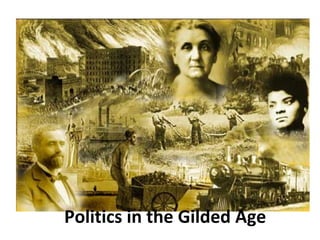
Politics in the Gilded Age
- 1. Politics in the Gilded Age
- 2. The Emergence of Political Machines: • Cities experience rapid growth in the late 19th century • Inefficient government in the beginning • Social Darwinism, the best will survive • Cities are receptive to a new power structure, the political machine, the city boss
- 3. The Political Machine: • An organized group controlled the activities of a political party in a city • Offered services to voters and businesses in exchange for political or financial support In this 1899 cartoon from Puck, all of New York City politics revolves around boss Richard Croker.
- 4. Organization of the Political Machine • The political machine was organized like a pyramid – Base: local precinct workers and captains (gain city support on a city block) – Level 2: Ward boss (worked to secure the vote in all precincts in the ward) – Level 3: City boss (controlled the activities of the political party)
- 5. The Political Boss: • Controlled access to municipal jobs and business licenses • Influenced the courts • Built waterworks, sewer systems, parks, schools, hospitals, and orphanages • Solved Urban Problems • Many bosses were first and second generation immigrants • Provided solutions and helped immigrants adjust to the culture and life of America
- 6. Municipal Graft: • Many political bosses fell victim to corruption • Once a political machine got its candidates into office, it could take advantage of numerous opportunities for graft, the illegal use of political influence for personal gain
- 7. Boss Tweed – Became head of Tammany Hall, New York City’s powerful Democratic political machine, in 1868 – Between 1868 and 1871, Boss Tweed led the Tweed Ring, a group of corrupt politicians, in defrauding the city – One scheme involved billing New York taxpayers 13 million on a construction job that cost only 3 million – Tweed and his friends pocketed about 10 million
- 8. Civil Service Replaces Patronage: • The desire for power and money that made local politics corrupt in the industrial age also infected national politics • Since the beginning of the 19th century, presidents have been complaining about the problem of patronage, or giving of government jobs to people who had helped a candidate get elected • Reformers began to push for changes and adopted a merit system of hiring
- 9. Civil Service Replaces Patronage: • Jobs in civil service-government administration-should go to the most qualified persons • Rutherford B. Hayes, James A. Garfield, and Chester A. Arthur all supported reform over the patronage system • President Garfield angered many Stalwarts (receivers of the patronage system) when he appointed many reformers to patronage jobs
- 10. Civil Service Replaces Patronage: • An angry lawyer, turned down for a job by the president, gunned down the president (assassinated) on July 2, 1881 • President Arthur pushed Congress to pass civil service law • The resulting Pendleton Civil Service Act of 1883 authorized a bipartisan service commission to make appointments to federal jobs through a merit system based on candidates’ performance on an examination • Public administration became more honest and efficient • Because officials could no longer pressure employees for campaign contributions, politicians turned to other sources of donations
- 11. Business Buys Influence: • With employees no longer a source of campaign contributions, politicians turned to wealthy business owners • The alliance between government and big business became stronger than ever